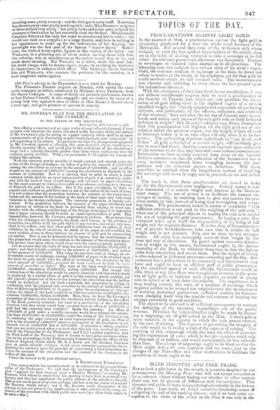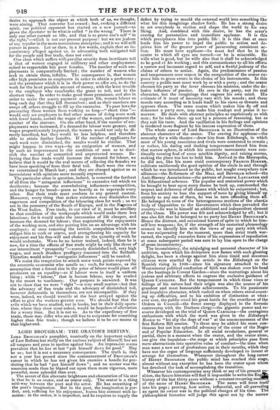BLIND INDUSTRY AND FREE TRADE.
NOT to look a gift-horse in the mouth, is a maxim despised by our contemporary the Horning Post; who will not accept cooperation for a common object without finding out whether in other matters there may not be ground of difference with the coadjutor. This niceness and pride of taste is a psychological curiosity in the history of the press. Last week, we found ourselves discussing means of mitigating the toil of the working classes ; and if we took some exception to the views of the writer in the Post, it was only in the desire to approach the object at which both of us, we thought, were aiming. That converse has ceased ; but, evoking a different spirit, our political opponent has started on a new pursuit—to prove the Spectator to be what is called "in the wrong." There is only one other pursuit as idle, and that is to prove one's self "in the right,"—which is not our present purpose : but we are jealous of any repulse in the more momentous enterprise ; and it we will still pursue in peace. Let us then, in a few words, explain that an inconsistency alleged against us, in advocating both mitigated toil for the people and free trade, does not exist. One class which suffers with peculiar severity from inordinate toil is that of women engaged in millinery and other employments suited to respectable but poor females. The number of such employments is comparatively limited ; the number of women who seek to obtain them, infinite. The consequence is, that women offer high premiums to employers in order to obtain a preference ; and the premiums which it is in their power to offer are, to do the work for the least possible amount of money, with the least trouble to the employer who vouchsafes the grant to toil, and in the shortest time. In order to make good those premiums, and also in order to make the scanty payment support life, women labour so long each day that they kill themselves ; and as their numbers are swept off, others struggle to fill up the vacancies. To pass laws for preventing those women from working so long—" short time "would only set employers to find other means of doing more work with fewer hands, curtail the wages of the women, and augment the number of the starvers. On the other hand, if the number of employments were increased, if a demand for labour were greater, and wages proportionately improved, the women would not only be directly benefited, but they would be less helpless, and therefore able to attain further benefits. If the number of applicants for such work were diminished, the results would be similar. That might happen in two ways—by an emigration of women, and by such an improvement in the condition of men as to diminish the number of unmarried and unprotected women. Believing that free trade would increase the demand for labour, we believe that it would be the real means of relieving the females we have been speaking of from their fatal toil. Such were the views we entertained in March last ; and they are charged against us as inconsistent with opinions more recently expressed.
The particular class in question, indeed, is removed the furthest of all from the "antagonist influences" to excessive toil which we desiderate ; because the overwhelming influences—competition, and the hunger for bread—press so heavily as to supersede every other. But their trade must conform to any general custom. Moreover, every thing that makes existence easy diminishes the eagerness and competition of the labouring class for work ; as we see in the peasantry of the South of Europe, and in the Negroes of the West Indies. Free trade, in our view of it, must be ancillary to that condition of the workpeople which would make them less laborious; for it would make the necessaries of life cheaper, and increase the demand for labour; thus augmenting the enjoyments of the working man, and also putting him on an advantage with his employer ; at once removing the terrible compulsion which now obliges him to work or starve, and strengthening his capacity for enjoyment and his free-will and choice in the quantity of work be would undertake. Were he no better trained, indeed, than he is now, for a time the effects of free trade might be only like those of our intermittent "prosperity "—scarcely diminished toil, very high wages, and much drunken profligacy crammed into the Sabbath. Therefore would other "antagonist influences" still be needed. We resist the temptation to attack some weak points exposed by the eccentric economist who assails us : such, for instance, as the assumption that a forced rise in the price of labour would place all producers on an equality—as if labour were in itself a uniform thing ; while "labour," that is human labour, may be evaded by the resort to machinery. Our purpose is answered. It was not to show that we were "right "—a very small matter—but that the advocacy of free trade and the advocacy of diminished toil, however debateable in themselves, are not incompatible. If they were, indeed, we should tremble at the host arrayed against the effort to give the workers greater ease. We should fear that the evils which we have studied, not in books, but in their daily operation, where they show most naked, would be hopeless of alleviation for a weary time. But it is not so. As to the expediency of free trade, those may differ who are still free to cooperate for something higher than free trade ; though we believe it to be one means to that higher end.



























 Previous page
Previous page